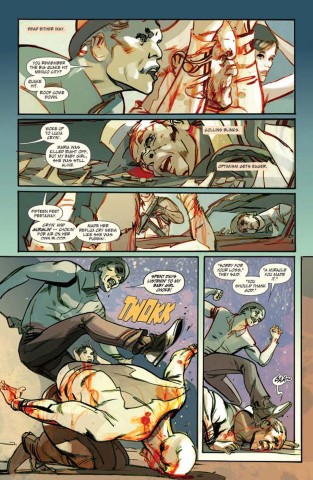While Marvel and DC might hold claim to some of
the most memorable comic book characters, I fully stand by the
belief that the best stories have always belonged to the shorter
series. From Watchmen to Transmetropolitan, a lot can
be said for condensed, concentrated stories. The Last Days of
American Crime, a 3-issue (approx. 180 pages total) miniseries,
is definitely looking to fit into that latter category.

Penned by Rick Remender, who's done work for
Marvel, IDW, Image, Dark Horse, and now Radical, and drawn by Greg
Tocchini, Crime tells the story of an America in the not too
distant future. The government, buried under very real threats of
crime and terrorism, has turned to a radical solution. They've
successfully developed a broadcast signal, the API (American Peace
Initiative), that will make it impossible for anyone in the country
to knowingly commit an unlawful act.
In their bid to create a utopian America, the
government has chosen to distract the populace by also installing an
all-digital (and very traceable) currency system, making cash
worthless and in the process, threatening the livelihood of
criminals everywhere.
Graham Bricke, a character whose name and
demeanor could easily have been pulled from an issue of Sin City,
is a career criminal looking to get one last score during the
titular "last days of American crime." Of course, his motivations
aren't quite so simple, as we find out through the series. His plan
though, seems incentive enough however, without exaggeration being
the most lucrative crime in American history. He plans to steal and
hack one of the boxes that charge the currency cards, giving him
access to an unlimited amount of funds. It's a deceptively simple
idea however, one that will require a great deal of help to pull
off. To complicate this, Bricke becomes aware of the government
broadcast when it's leaked by the media, putting them on a very
strict timeframe of less than seven days.
The third, and final, entry into the series finds
Bricke on the cusp of the API broadcast, and running out of time to
get his affairs in order. Luckily though, series writer Rick
Remender seems comfortably on top of the situation. The book very
nicely brings its subplots to a peak. Whether it be Bricke's
dealings with the Mexican mobsters, his relationship (and past) with
his mother, or Shelby and Kevin's backstories, there's a lot that
needed resolution, but Remender handled it all rather brilliantly.
With great dialogue and impressive staging all-around, there are
some really awesome moments in the issue. And while none of it
really lives up to any of the bigger moments from the issues past,
there's still a lot to enjoy in this finale. Sure I would've liked
to see something a little more ambitious; but it was nice to see
their plan finally go into motion, and all of the characters and
setups intertwine and resolve.
Unfortunately, his character arcs on the whole
aren't quite so neat. As I mentioned before, Bricke could just have
easily found a home in Sin City, and Remender seems to have
trouble pulling any of his leads out of the muck of cliché and
treaded ground and into anything too original. The archetypes work
for the most part, but in a story with such a unique twist, I really
would've liked to see more. Kevin's character definitely got a
chance to shine in this issue however, with some extended
development and a great resolution to the backstory Remender laid
the foundation for in issue two. It definitely didn't reach the
heights of badassery we saw previously, and it may have not been too
shocking, but it's a fitting culmination for an interesting
character.
On the whole, the climax of the story felt
smooth, natural, and compelling. While I feel like the overall
resolution was a bit lacking, and the twists and turns maybe be a
little too familiar, I was more than happy to go along for the
ride.
What definitely keeps the issue, and the series
on the whole, from falling prey to stereotypes and unwelcome
familiarity, is the adrenaline of the narrative. It moves at such a
frenetic pace, without sacrificing focus or storytelling. Much of
this must be due in large part to some excellent, excellent artistry
by Greg Tocchini. With a vibrant mix of color and grit, Tocchini's
style fits the series so perfectly. Like much of American Crime,
it's not anything we haven't seen before, but by God it's still
great.
While it's certainly no Transmetropolitan,
American Crime definitely ranks up there among the scores of
stories in a similar vein. Its unique spin on the crime genre, with
some awesome sci-fi overtones, make it an extremely enjoyable read.
It might not be an instant classic, but for such a contained,
condensed story, it's a hell of a read.